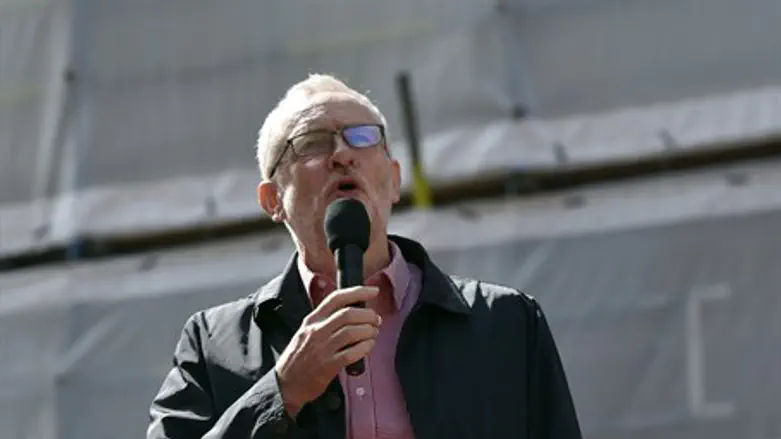
An official inquiry by the UK Labour Party into allegations of institutional anti-Semitism within the party's student club at the prestigious Oxford University has submitted its initial findings - and is already being roundly accused of orchestrating a cover-up.
The Royall Inquiry - led by senior Labour politician Baroness Janet Royall - was commissioned after Oxford Labour Club co-chair Alex Chalmers resigned, due to what he described as rampant anti-Semitism among Labour Party activists, saying the student Left "have some kind of problem with Jews."
A previous inquiry - which was rumored to implicate senior Labour student activists in extreme anti-Semitic behavior - was controversially shelved, without any explanation, already then provoking protests of a cover up by the UK's leading left-wing party.
Since then, the party has been engulfed by a string of revelations about anti-Semitic social media and other statements by its members, which has resulted in the suspension of over 100 members - including an MP.
A full-scale probe into anti-Semitism within the Labour Party as a whole has also been launched, though it too has already been criticized. Among a number of issues panned by critics is the fact that the head of that probe, Shami Chakrabarti, joined the Labour Party prior to taking the job - though she insists her membership will not impact on her objectivity. Another member of the inquiry was revealed to be a prominent member of a radical leftist group which, even prior to the investigation, dismissed anti-Semitism allegations as "baseless."
Though her full report is yet to be published, Baroness Royall said she would be recommending 11 points for "immediate and sustained action" against anti-Semitism, according to the Jewish Chronicle.
Royall denied any evidence of institutional anti-Semitism, despite Chalmers' public stand, which was later backed by scores of Jewish students, who testified in the aftermath of his resignation to the anti-Semitic abuse they were regularly subjected to by leftist students. Chalmers himself is not Jewish.
It also came despite sources close to the inquiry telling the Jewish Chronicle that the full report was set to corroborate accusations against many Labour students accused of anti-Semitism.
More astonishingly still, Royall opposed suggestions that party members should be permanently expelled for anti-Semitism - because they might change their minds.
"I recognise that people may change their views and that where that is demonstrable a person may be allowed to seek NEC approval for any future application to join the Labour Party," she told Labour’s National Executive Committee, which approved all of her recommendations.
Among other things, she recommended that Labour students should undergo training with the Jewish Labour Movement on how to deal with anti-Semitism.
The Campaign Against Anti-Semitism was among several Jewish groups to voice their concern that the inquiry was part of an attempt by the Labour leadership to cover up the mounting anti-Semitism scandal, in the wake of its poor results in recent local elections.
"Only the Executive Summary has been published, and it tells us nothing new, except that Baroness Royall thinks the Co-Chair of Oxford University Labour Club was wrong when he resigned over institutional anti-Semitism," Campaign for Anti-Semitism spokesman Jonathan Sacerdoti told Arutz Sheva.
"What was left out of the publication? And why is it not being fully revealed today? There are no public findings about the anti-Semitic incidents at the club and those who perpetrated them, and it seems that the report is designed to be unremarkable," he fired.
Perhaps this is because Baroness Royall has been made Co-Vice Chair of the desperately flawed Chakrabati inquiry into anti-Semitism in Labour."
The Jewish Leadership Council also sounded a markedly skeptical tone.
While expressing the Council's "appreciation to Baroness Royall for her efforts," JLC Chief Executive Simon Johnson slammed the report's findings as "incomplete," and also questioned why publication of the full report was being delayed.
"We regard them as incomplete and are disappointed with the NEC's decision to suppress the release of the full inquiry," Johnson said.
"Organisations that do not publish full reports, particularly when they may be critical, tend to lose legitimacy in the eyes of the general public, as was the case when the media were rightly critical when FIFA tried to publish a very sanitised version of the report into the World Cup bidding procedure.
"We are entitled to expect the publishing of the full Royall report along with the Chakrabarti Inquiry. We will continue to support our colleagues in the community with their submissions to that Inquiry."
The President of the Board of Deputies of British Jews - UK Jewry's major representative organization - noted that despite her reticence to say so explicitly, Royall's findings in fact corroborated allegations of anti-Semitism at Oxford Union Labour Club.
"It is clear from this report that Baroness Royall has concluded that there is a problem of anti-Semitism at Oxford University Labour Club (OULC) which must be addressed," said Jonathan Arkush.
"There would be no need for 11 recommendations for 'immediate and sustained action' if Baroness Royall had not concluded that there were serious problems to tackle.
"We were encouraged by some of these recommendations, namely the suggested use of the Macpherson definition and the idea of training for Labour candidates and activists.
"However, in view of the limited nature of what has been released, it is difficult to judge what the report says on important matters, such as where extreme anti-Israel rhetoric, such as calling Jews ‘Zios’ or singing songs like ‘rockets over Tel Aviv’, becomes anti-Semitic. These are material considerations when considering what happened in the case of the Oxford University Labour Club.
"Furthermore, we are disappointed that the full report has not been released, in apparent contradiction to Baroness Royall’s express wishes. We note that the original Labour Students investigation was also not released. There seems to be a culture of suppressing or delaying the release of reports on this crucial issue growing up that is not helpful for progress."